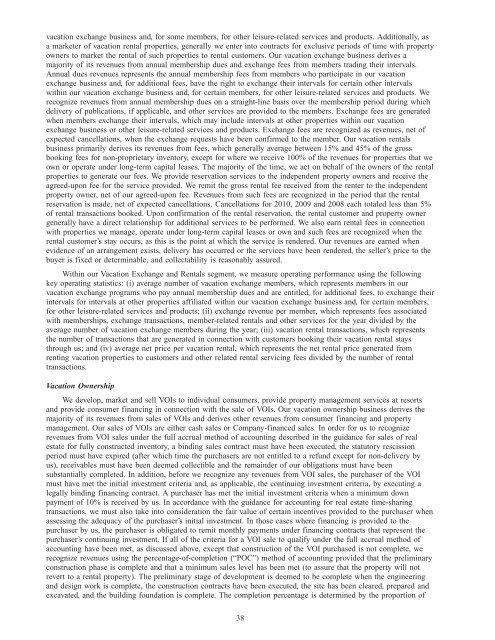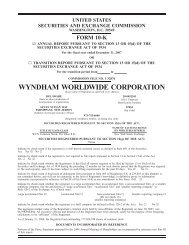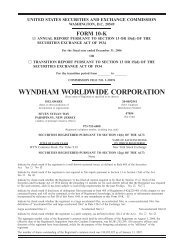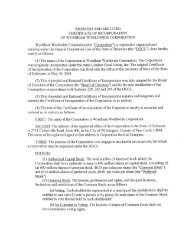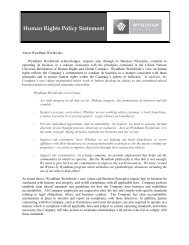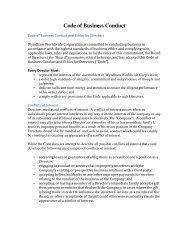WYNDHAM WORLDWIDE CORPORATION
WYNDHAM WORLDWIDE CORPORATION
WYNDHAM WORLDWIDE CORPORATION
Create successful ePaper yourself
Turn your PDF publications into a flip-book with our unique Google optimized e-Paper software.
vacation exchange business and, for some members, for other leisure-related services and products. Additionally, as<br />
a marketer of vacation rental properties, generally we enter into contracts for exclusive periods of time with property<br />
owners to market the rental of such properties to rental customers. Our vacation exchange business derives a<br />
majority of its revenues from annual membership dues and exchange fees from members trading their intervals.<br />
Annual dues revenues represents the annual membership fees from members who participate in our vacation<br />
exchange business and, for additional fees, have the right to exchange their intervals for certain other intervals<br />
within our vacation exchange business and, for certain members, for other leisure-related services and products. We<br />
recognize revenues from annual membership dues on a straight-line basis over the membership period during which<br />
delivery of publications, if applicable, and other services are provided to the members. Exchange fees are generated<br />
when members exchange their intervals, which may include intervals at other properties within our vacation<br />
exchange business or other leisure-related services and products. Exchange fees are recognized as revenues, net of<br />
expected cancellations, when the exchange requests have been confirmed to the member. Our vacation rentals<br />
business primarily derives its revenues from fees, which generally average between 15% and 45% of the gross<br />
booking fees for non-proprietary inventory, except for where we receive 100% of the revenues for properties that we<br />
own or operate under long-term capital leases. The majority of the time, we act on behalf of the owners of the rental<br />
properties to generate our fees. We provide reservation services to the independent property owners and receive the<br />
agreed-upon fee for the service provided. We remit the gross rental fee received from the renter to the independent<br />
property owner, net of our agreed-upon fee. Revenues from such fees are recognized in the period that the rental<br />
reservation is made, net of expected cancellations. Cancellations for 2010, 2009 and 2008 each totaled less than 5%<br />
of rental transactions booked. Upon confirmation of the rental reservation, the rental customer and property owner<br />
generally have a direct relationship for additional services to be performed. We also earn rental fees in connection<br />
with properties we manage, operate under long-term capital leases or own and such fees are recognized when the<br />
rental customer’s stay occurs, as this is the point at which the service is rendered. Our revenues are earned when<br />
evidence of an arrangement exists, delivery has occurred or the services have been rendered, the seller’s price to the<br />
buyer is fixed or determinable, and collectability is reasonably assured.<br />
Within our Vacation Exchange and Rentals segment, we measure operating performance using the following<br />
key operating statistics: (i) average number of vacation exchange members, which represents members in our<br />
vacation exchange programs who pay annual membership dues and are entitled, for additional fees, to exchange their<br />
intervals for intervals at other properties affiliated within our vacation exchange business and, for certain members,<br />
for other leisure-related services and products; (ii) exchange revenue per member, which represents fees associated<br />
with memberships, exchange transactions, member-related rentals and other services for the year divided by the<br />
average number of vacation exchange members during the year; (iii) vacation rental transactions, which represents<br />
the number of transactions that are generated in connection with customers booking their vacation rental stays<br />
through us; and (iv) average net price per vacation rental, which represents the net rental price generated from<br />
renting vacation properties to customers and other related rental servicing fees divided by the number of rental<br />
transactions.<br />
Vacation Ownership<br />
We develop, market and sell VOIs to individual consumers, provide property management services at resorts<br />
and provide consumer financing in connection with the sale of VOIs. Our vacation ownership business derives the<br />
majority of its revenues from sales of VOIs and derives other revenues from consumer financing and property<br />
management. Our sales of VOIs are either cash sales or Company-financed sales. In order for us to recognize<br />
revenues from VOI sales under the full accrual method of accounting described in the guidance for sales of real<br />
estate for fully constructed inventory, a binding sales contract must have been executed, the statutory rescission<br />
period must have expired (after which time the purchasers are not entitled to a refund except for non-delivery by<br />
us), receivables must have been deemed collectible and the remainder of our obligations must have been<br />
substantially completed. In addition, before we recognize any revenues from VOI sales, the purchaser of the VOI<br />
must have met the initial investment criteria and, as applicable, the continuing investment criteria, by executing a<br />
legally binding financing contract. A purchaser has met the initial investment criteria when a minimum down<br />
payment of 10% is received by us. In accordance with the guidance for accounting for real estate time-sharing<br />
transactions, we must also take into consideration the fair value of certain incentives provided to the purchaser when<br />
assessing the adequacy of the purchaser’s initial investment. In those cases where financing is provided to the<br />
purchaser by us, the purchaser is obligated to remit monthly payments under financing contracts that represent the<br />
purchaser’s continuing investment. If all of the criteria for a VOI sale to qualify under the full accrual method of<br />
accounting have been met, as discussed above, except that construction of the VOI purchased is not complete, we<br />
recognize revenues using the percentage-of-completion (“POC”) method of accounting provided that the preliminary<br />
construction phase is complete and that a minimum sales level has been met (to assure that the property will not<br />
revert to a rental property). The preliminary stage of development is deemed to be complete when the engineering<br />
and design work is complete, the construction contracts have been executed, the site has been cleared, prepared and<br />
excavated, and the building foundation is complete. The completion percentage is determined by the proportion of<br />
38


